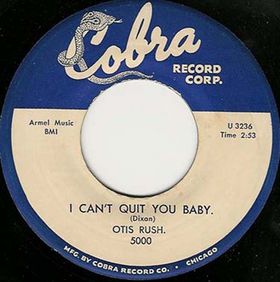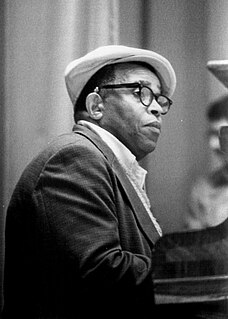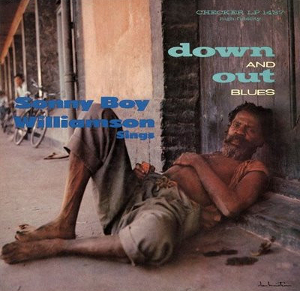Related Research Articles
Alex or Aleck Miller, known later in his career as Sonny Boy Williamson, was an American blues harmonica player, singer and songwriter. He was an early and influential blues harp stylist who recorded successfully in the 1950s and 1960s. Miller used various names, including Rice Miller and Little Boy Blue, before calling himself Sonny Boy Williamson, which was also the name of a popular Chicago blues singer and harmonica player. To distinguish the two, Miller has been referred to as Sonny Boy Williamson II.

Junior Wells was an American Chicago blues vocalist, harmonica player, and recording artist. He was one of the pioneers of the amplified blues harp-style associated with Chicago. Wells is best known for his signature song "Messin' with the Kid" and his 1965 album Hoodoo Man Blues, described by the critic Bill Dahl as "one of the truly classic blues albums of the 1960s".

James Henry Cotton was an American blues harmonica player, singer and songwriter, who performed and recorded with many of the great blues artists of his time and with his own band. He played drums early in his career but is famous for his harmonica playing.
The American Folk Blues Festival was a music festival that toured Europe as an annual event for several years beginning in 1962. It introduced audiences in Europe, including the UK, to leading blues performers of the day such as Muddy Waters, Howlin' Wolf, John Lee Hooker and Sonny Boy Williamson, most of whom had never previously performed outside the US. The tours attracted substantial media coverage, including TV shows, and contributed to the growth of the audience for blues music in Europe.

"I Can't Quit You Baby" is blues song written by Willie Dixon and first recorded by Chicago blues artist Otis Rush in 1956. It is a slow twelve-bar blues ensemble piece, with lyrics about the consequences of an adulterous relationship which is difficult to end.

Crusade is the fourth album and third studio album by the British blues rock band John Mayall & the Bluesbreakers, released on 1 September 1967 on Decca Records. It was the follow-up to A Hard Road, also released in 1967. As with their two previous albums, Crusade was produced by Mike Vernon. The album was the first recordings of the then-18-year-old guitarist Mick Taylor.

"Stop Breaking Down" or "Stop Breakin' Down Blues" is a Delta blues song recorded by Robert Johnson in 1937. An "upbeat boogie with a strong chorus line", the lyrics are partly based on Johnson's experience with certain women:

Taj Mahal is the debut album by American blues guitarist and vocalist Taj Mahal. Recorded in 1967 with backing musicians that included guitarists Jesse Ed Davis and Ry Cooder, it was released by Columbia Records in 1968.

The Red Devils were a Los Angeles-based blues rock band who were active from 1988 to 1994. With their no-frills approach and singer Lester Butler's convincing Chicago-style blues harp, they were a popular fixture on the Los Angeles club scene and toured the U.S. and Europe. The band released a live album, a four-song EP, and recorded songs with Mick Jagger and Johnny Cash. By 1994, the band had broken up, although some members occasionally perform with guest musicians as the Red Devils or their earlier name, the Blue Shadows. In 2017, such a lineup toured and recorded Return of the Red Devils in the Netherlands.
Lester Butler was an American blues harmonica player and singer. He achieved fame as the singer and harmonica player for the Los Angeles, California, blues rock band, the Red Devils

Sonny Boy Williamson & the Yardbirds is a live album by Chicago blues veteran Sonny Boy Williamson II backed by English rock band the Yardbirds. It was recorded at the Crawdaddy Club in Richmond, Surrey on December 8, 1963. However, the performances were not released until early 1966, after a string of Top 40 hits by the Yardbirds.

Lafayette Leake was an American blues and jazz pianist, organist, vocalist and composer who played for Chess Records as a session musician, and as a member of the Big Three Trio, during the formative years of Chicago blues. He played piano on many of Chuck Berry's recordings.
Little Sonny is an American electric blues harmonica player, singer and songwriter. His early mentor and inspiration was Sonny Boy Williamson II. Nevertheless, Little Sonny stated that his nickname was originated by his mother: "[She] called me 'Sonny boy' from the time I can remember." He has released eight albums, including three for a subsidiary of Stax Records. His 1973 release, Hard Goin' Up, reached the Top 50 in the Billboard R&B chart.

His Best is a 1997 greatest hits compilation album by Sonny Boy Williamson II released by Chess and MCA Records in May as a part of The Chess 50th Anniversary Collection which released many albums titled His Best for artist such as Bo Diddley, Little Walter, and others.

"Don't Start Me Talkin'" is a blues song written and performed by Sonny Boy Williamson II. It was Williamson's first single recorded for Checker Records, and reached number three in the US Billboard R&B chart in 1955.

Down and Out Blues is the first LP record by American blues musician Sonny Boy Williamson. The album was released in 1959 by Checker Records.
"Sugar Mama" or "Sugar Mama Blues" is a song that is a standard of the blues. Called a "tautly powerful slow blues" by music journalist Charles Shaar Murray, it has been recorded by numerous artists, including early Chicago bluesmen Tampa Red, Sonny Boy Williamson I, and Tommy McClennan. John Lee Hooker and Howlin' Wolf later adapted "Sugar Mama" for electric blues and rock group Led Zeppelin reworked it during early recording sessions.
"Early in the Morning" is a blues song that was recorded by Sonny Boy Williamson I in 1937. Identified as a blues standard, it was inspired by earlier blues songs. "Early in the Morning" has been recorded by various musicians, including Junior Wells, who made it part of his repertoire.

The Real Folk Blues is an album by blues musician Sonny Boy Williamson II compiling songs recorded in Chicago between 1957 and 1964. Released by Chess Records in 1966, the album contains mostly previously unissued material, including "Checkin' Up on My Baby" and "Bring It On Home", which have been called "some of the most accomplished masterpieces of postwar blues".
Bummer Road is a compilation album by the American blues musician Sonny Boy Williamson II, released in 1969. It achieved notoriety due to the inclusion of 11 minutes of studio outtakes related to the track "Little Village", where Williamson and producer Leonard Chess argue about the song. The album was issued with a label advising that the track was not suitable for airplay, due to profanity—allegedly, it is the first blues album to carry any kind of "explicit lyrics" sticker. "Little Village" inspired the name of Little Village, a band that included Ry Cooder, Jim Keltner, Nick Lowe, and John Hiatt.
References
- 1 2 3 4 Herzhaft, Gerard (1992). "Sonny Boy Williamson". Encyclopedia of the Blues. University of Arkansas Press. pp. 385, 442. ISBN 1-55728-252-8.
- 1 2 Fancourt, Les (2000). Stop Breaking Down – The Essential Recordings of Sonny Boy Williamson (Album notes). Sonny Boy Williamson I. Indigo Records. p. 1. IGOCD 2128.
- ↑ Rush, Otis (1993). The Cobra Records Story: Chicago Rock and Blues 1956–1958 (Album notes). Various artists. Capricorn Records. p. 10. 9-42012-2.
- 1 2 Humphrey, Mark (1993). The Essential Sonny Boy Williamson (Album notes). Sonny Boy Williamson II. MCA/Chess Records. p. 22. CHD2-9343.
- ↑ Cook, Stephen. "Sonny Boy Williamson II: The Real Folk Blues –Review". AllMusic . Retrieved January 7, 2016.
- 1 2 Erlewine, Stephen Thomas. "The Very Best of Mick Jagger –Review". AllMusic . Retrieved June 28, 2021.
- ↑ Leroy, Dan (2007). The Greatest Music Never Sold: Secrets of Legendary Lost Albums by David Bowie, Seal, Beastie Boys, Chicago, Mick Jagger, and More!. Backbeat Books. p. 129. ISBN 978-0-87930-905-3.